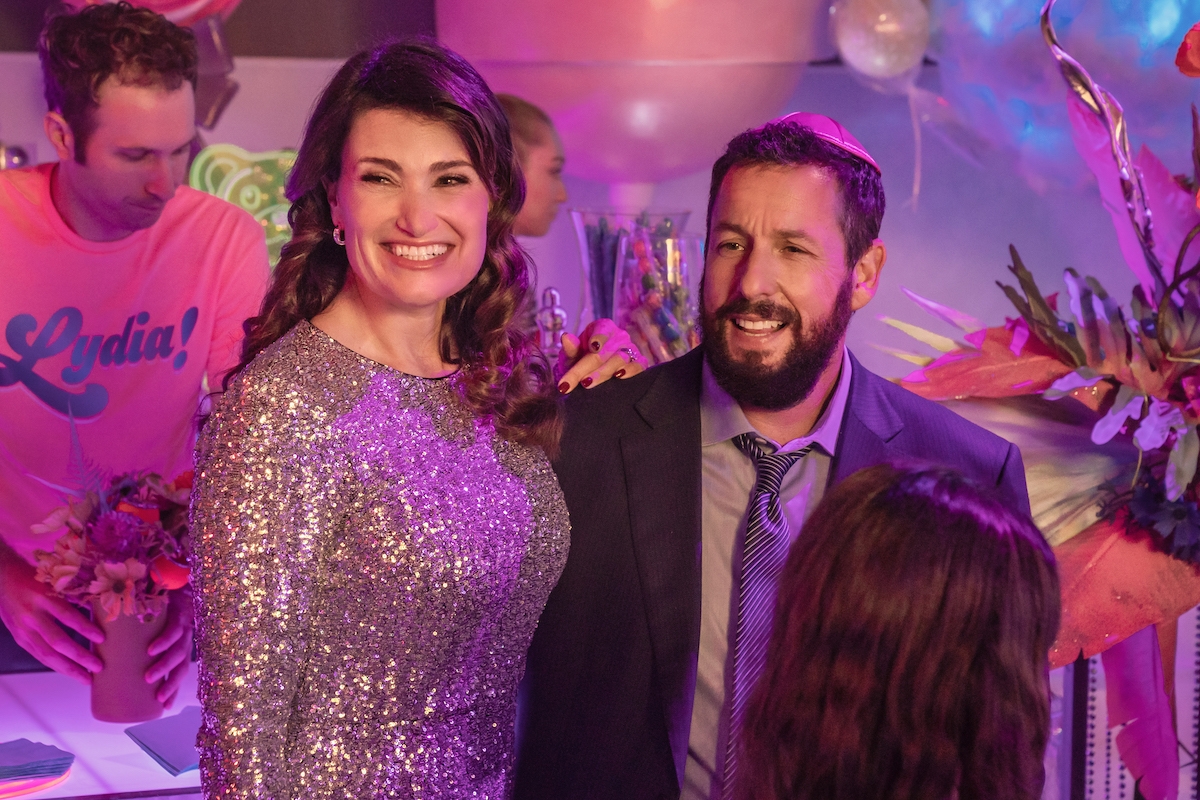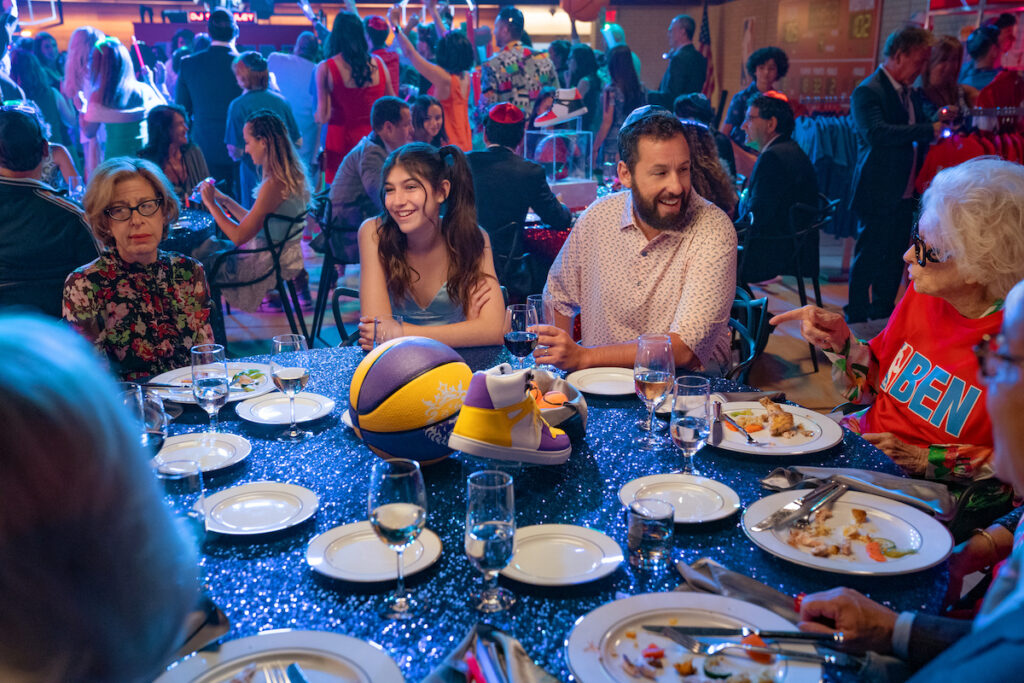I was thrilled when I heard that Adam Sandler was going to produce and star in a bat mitzvah movie for Netflix based on the book “You Are SO Not Invited to My Bat Mitzvah.”
What Jewish person wouldn’t be? Sandler is one of the greatest comedians of our time, a man who gave us cinematic flops and masterpieces that are all so eminently watchable. But perhaps more relevantly, he is the man who gave us “The Chanukah Song” and its many versions, a song that connects American Jews of all levels of faith by our favorite pastime: touting Jewish celebrities. Like Idina Menzel, his co-star in the movie, sang about Sandler earlier this year, he makes us “proud to be a Jew.”
That kind of pride in being Jewish, passed on to Sandler by his own parents (Judy and Stanley, may Stan’s memoriy be a blessing), isn’t just one he’s passed down to his daughters, Sunny and Sadie, but one that the Sandler family passes onto us viewers of “You Are So Not Invited to My Bat Mitzvah,” brilliantly directed by Sammi Cohen and with a script full of wonderful Jewish specificities written by Allison Peck, based on the book by Amanda Stern under the pseudonym Fiona Rosenbloom.
In fact, I’d argue that Adam Sandler just gave us the best bat mitzvah movie of all time. Yes, the competition isn’t exactly stiff, but we have been inundated with a ton of bar, bat and b’nai mitzvah episodes on TV as of late, from “And Just Like That…” to “Fleishman Is In Trouble” and “Pen15.” This movie really stands out for how deep its Jewish representation goes — from Jewish bubbes, to a dad who calls his daughter tateleh, to a lot of great Jewish dad jokes that we’ve all heard before, to biblical references (the story of David and Batsheva is a recurring motif and I love it) and explorations of Jewish values. It also stands out as a celebration of Jewish joy — at no point in this movie does the drama its heroine experience have anything to do with her ambivalence about her Jewish identity.
The movie tells the story of Stacy Friedman, played by Sandler’s real-life daughter Sunny Sandler, her friendship with the sweet Lydia Rodriguez Katz (Samantha Lorraine) and the boy who comes between them, Andy Goldfarb (boo, Andy Goldfarb! But Dylan Hoffman does play an aloof and not at all nice Jewish boy very well). When Stacy finds Lydia kissing Andy, she goes on a mission of revenge that includes sharing cruel rumors about her best friend and trying to “steal” Andy back, all the while ignoring her responsibilities as a future bat mitzvah, getting called out by Rabbi Rebecca (played by SNL cast member Sarah Sherman) and attending a bunch of over-the-top bat mitzvah parties.
The much-sought after DJ Shmuley, played by Israeli actor Ido Mosseri, likes to call his crowd of adoring revelers “mishpacha,” Hebrew for family, and here’s something lovely about this being a real mishpacha project. Sadie Sandler’s Ronnie Friedman, Stacy’s older sister, is funny, biting and full of wry humor, the perfect balance for Stacy. It’s also such a delight to see Jackie Sandler, the girls’ mom and Sandler’s wife, in a big role as Lydia’s newly divorced mom. Certainly, there are lots of great Jewish legacy families of actors — from the Apatows to the Adlons — but for these obviously talented girls to launch their careers with such a Jewish project (with Haim posters in the background as Stacy studies for her Torah portion!) is pretty amazing. The casting in this movie goes beyond Jewish authenticity into something even more meaningful.
I loved Adam Sandler as Danny Friedman, Stacy and Ronnie’s incredibly devoted Jewish dad. There’s something so lovely about the fact that Stacy and her dad love spending time together, joking with each other and going to the movies. Even when they have fundamental disagreements about what a bat mitzvah should be (Danny says his bar mitzvah theme was “Jewish,” and in a heated argument asks if we survived the Holocaust for Stacy to have a mojito bar at her bat mitzvah), they still always find a way back to each other. And obviously, I love that he was reunited with Idina Menzel in this movie, having first played a very different kind of married couple in “Uncut Gems,” giving us the Jewish parents we all wish we had.
Yet beyond this movie being a lovely and affirming representation for Jewish kids and families, I think it’s also, as our elders might say, good for the Jews.
As an Israeli immigrant to America, there are so many things that I’ve been awed by and love about the American Jewish experience that are well drawn in this movie — rabbis like Rabbi Rebecca, the kind of color and fun that they paint onto the Jewish experience, the sense of community and acceptance that so many synagogues and Hebrew schools in this country foster. Rabbi Rebecca, in her technicolor outfits, has a way of both transmitting Jewish stories and values while also being entertaining and real and wonderfully weird.
And yet, the American lavish bat and bar mitzvah scene is one that I’ve always struggled with. They feel so ostentatious, so disconnected with Jewish values. Surprisingly, this movie kind of rehabilitated them for me. Because the obvious message here is that it shouldn’t be about the party, and though the final scene is inevitably a big bash, that’s not what this movie is really about. It manages to make something funny, charming and full of Jewish meaning that still lets teen girls have a big party, wear pink dresses, and be in the moment while also learning to be better humans. That is a triumph to me.
Some viewers may worry about what it means to portray Jews as wealthy people who throw ludicrous parties in a film streaming on Netflix. But I don’t really think the Jews in this movie feel greedy or money-grubbing. Stacy’s desire for an over-the-top party is relatable for any teen, whether it’s reasonable or not. And lavish birthday parties and coming-of-age ceremonies aren’t uniquely Jewish. Despite living in big New Jersey houses, Stacy and Lydia don’t really come off as anything more than sometimes self-involved teens with crushes on the wrong guys (boo, Andy Goldfarb!).
I was not expecting to feel so deeply for Sunny’s Stacy, but something about her viscerally brought me back to the days of being a young teen, when you don’t really have an understanding of how much your actions impact others, and when everything feels so high stakes. I also loved that in “Are You There God? It’s Me Margaret” fashion, Stacy directs so many of her angst and wishes in open letters to God, and yet, unlike Margaret, her Jewish faith is not a source of bewilderment or discomfort, but something she takes for granted.
Yes, there are aspects of “You Are So Not Invited to My Bat Mitzvah” that won’t be relatable to all Jews — if you’re not Ashkenazi, if you aren’t accustomed to lavish bat mitzvah parties, if you don’t have access to the kind of Jewish spaces its main characters do. But there’s a general Jewish spirit to it that ties it all together. This movie has a Jewish soul.
At the end of the day, Stacy learns how to be a good friend, how to value meaning over appearances, and what doing a mitzvah really is. And if any non-Jewish viewers out there learn those same lessons, and can now equate them with being Jewish, then isn’t that ultimately a little bit of tikkun olam, healing the world, in action?
Probably the best line in the movie is when Adam Sandler’s character tells his daughter, “Welcome to being Jewish, we don’t get any breaks.” It’s so true — except that this movie really felt like we were getting a break, time to bond with our families, with our children, with our friends, about all the wonderful parts of being Jewish. It offers a moment to feel seen as a Jew in America. And I loved, so much, that we were invited to experience that.









